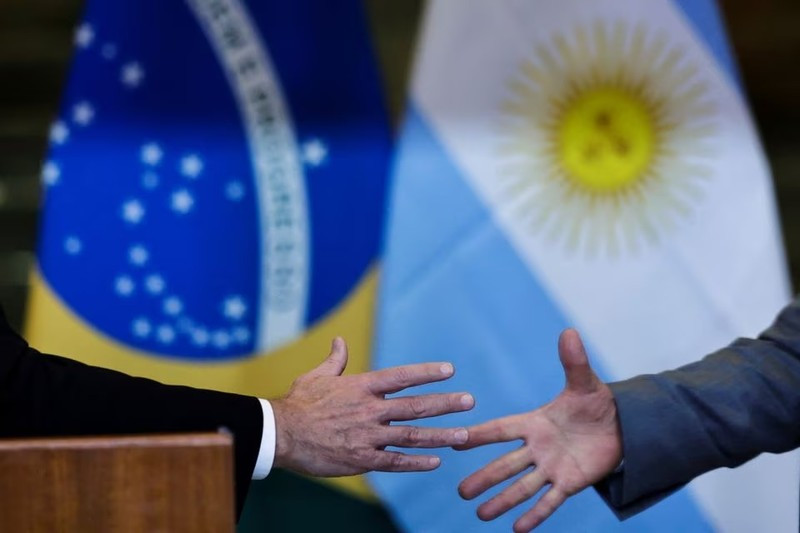Speaking after talks with President Fernández, who visited Brazil on May 2, Brazilian President Luiz Inácio Lula da Silva stressed that he would do everything to help Argentina in this difficult time. He made a commitment to his Argentine counterpart Alberto Fernández that Brasilia would give Buenos Aires maximum support in debt restructuring negotiations with the International Monetary Fund (IMF).
The leader of Latin America’s largest country also announced that he would speak with partners in the group of the world’s fastest-growing emerging markets (BRICS - Brazil, Russia, India, China, and South Africa) to propose measures to support Argentina, and plans to discuss the issue with the IMF.
During the four-hour meeting at the Brazilian Presidential Palace, the two leaders focused on discussing measures to boost bilateral trade, which has been hit hard in recent times by macroeconomic problems in Argentina, including foreign currency shortage, high inflation, and prolonged drought.
Among the initiatives discussed, the two leaders were interested in measures to use local currencies in bilateral trade transactions, thereby helping Brazil reduce the financial risks caused by exchange rate fluctuations of the US dollar and helping Argentina increase its foreign currency reserves.
The two South American countries are moving towards deeper economic integration, including the development of a common currency. During their meetings earlier this year, the leaders of Brazil and Argentina set the goal of overcome barriers to transactions, simplify and modernise rules, and encourage the use of local currency.
In particular, the two leaders also agreed to promote discussions on a common South American currency that can be used for both financial and trade sectors, thereby helping to reduce operating costs and limit other external obstacles. Brazil suggests calling the common currency between the two countries “sur”, which means south.
Leaders of the two countries hope that the introduction of this currency will boost regional trade and reduce dependence on the US dollar. Starting as a bilateral project, the initiative is expected to expand to other Latin American countries.
Brazil and Argentina are currently working to build a peaceful relationship for mutual development. The two countries affirmed that a number of agreements on defence, health, science, technology and innovation, and financial integration have been reached.
Brazilian businesses are interested in the 3 billion USD gas pipeline project named after the late President Néstor Kirchner - the most important natural gas transportation facility of neighbouring Argentina over the past 40 years. The Brazilian Development Bank (BNDES) decided to invest 689 million USD in the second phase of the Néstor Kirchner project. This is a gas pipeline from the Vaca Muerta field in the province of Neuquén in southern Argentina - an area with one of the largest unconventional oil and gas reserves in the world.
Strengthening bilateral cooperation will create favourable conditions for Brazil and Argentina to promote regional integration efforts as both countries are looking to return to the Union of South American Nations (UNASUR), the intergovernmental regional organisation established in 2008.
The two countries are also committed to strengthening MERCOSUR, in the context that the bloc needs to further promote trade inside and outside the bloc as MERCOSUR products play an important role in the world market amid the significant impact of the conflict in Ukraine on the global production chain.
MERCOSUR was established in 1991. It currently has five official members: Brazil, Argentina, Uruguay, Venezuela, and Paraguay. It is one of the leading production centres for food, raw materials and energy, and is a potential market with more than 280 million consumers.
Further promoting cooperation and integration programmes in Latin America through mechanisms such as the Community of Latin American and Caribbean States (CELAC), the revitalisation of UNASUR, and the creation of consensus in policies of the MERCOSUR bloc is the goal that both Brazil and Argentina are aiming for. In the context of the current volatile world situation, strengthening cooperation and regional integration will contribute to promoting internal resources for sustainable development.
















